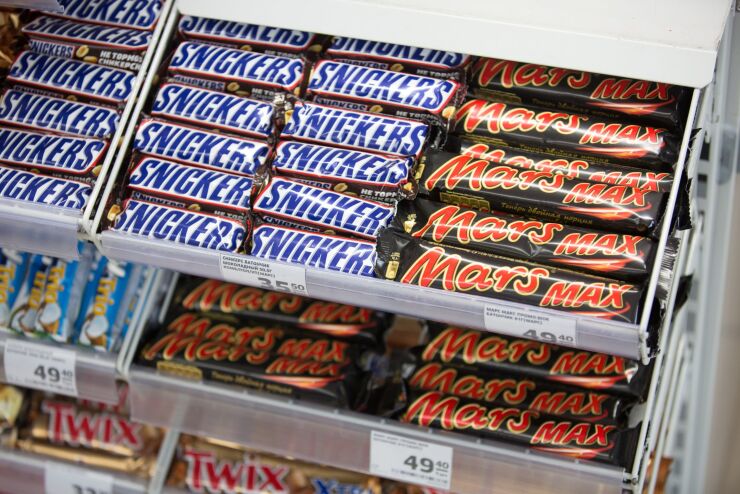With Amazon Go serving as both an inspiration and a threat, technology companies have spent the past couple of years perfecting the nuts and bolts of checkout-free retail — but removing the checkout means removing a key bottleneck that retailers rely on to sell tabloids, gum and candy.
Mars Wrigley stands to lose a significant point of interaction if more retailers adopt a checkout-free model, which is why it is getting in on the ground floor of innovation. As a result Mars and
This new retail model, pioneered by Amazon, moves the main point of interaction from the end of the visit to the beginning, where shoppers scan in using a mobile device to identify themselves and their payment account. Thereafter, cameras and sensors determine what each shopper has taken, and the shopper can then walk out the door without stopping to ring up their purchases.

"It’s easy to imagine how autonomous checkout can make their trip more convenient. But we know that the checkout experience also plays a role in balancing their satisfaction and emotional needs at the end of the trip, particularly when they’re seeking products to reward and recharge, like a treat or snack, or pick up essentials,” said James Mills, vice president of global category leadership at Mars Wrigley.
Amazon has experimented with different layouts for its stores. Its first store in Seattle had a liquor section that required a human to check shoppers' IDs. Later stores removed the liquor section in favor of catering to specific audiences. For example, Amazon Go's first New York store, in the Brookfield Place, sells breakfast and lunch items for people to take to the office; a newer store just a few blocks away seems focused on the afternoon pick-me-up by offering coffee and fountain sodas.
That new store also has a rack of candy just beyond the turnstiles, so customers can get their sugar fix as soon as they check in.
As more retailers experiment with the checkout-free model, Mars and Standard Cognition will work on new options for store design that balance operational efficiency, shopper satisfaction and financial optimization tied to autonomous checkout, according to Michael Suswal, co-founder and COO of Standard Cognition.
Grocery and convenience stores are "the types of retailers who are most likely to implement autonomous checkout," Suswal said.
Grocery chain
It took that experiment up a notch by literally putting the store on a truck and taking it to Amsterdam’s Schiphol Airport, one of Europe’s largest air hubs, for a more real-world look at how people can blur the lines between the supermarket and their home fridge.
AiFi’s strategy is to make its stores mobile, to quickly move where there’s the best chance for success.
Firms like Standard Cognition, Zippin, AiFi and nearly two dozen others are chasing checkout-free retail, providing merchants a path to dilute manual checkout while generating granular visual data that can inform marketing and support security. Zippin recently lured an investment from Brazilian retail chain
These companies have drawn
Shoppers tap a contactless debit card, Apple Pay or Samsung Pay to open Albert Heijn's store automatically, then grab the products they want and leave. The items are registered and paid for following the contactless check in.
The check-in is a vital part of checkout-free stores, since it provides security and is the pivot to data-driven cross sales and marketing. The company that can best match checkout-free technology to consumer needs and comfort will have the inside position as checkout-free tech matures in the coming years to accommodate larger stores.
“Once one of the vendors that are deploying autonomous checkout can retrofit a legacy store, legacy stores will freeze the [checkout] hardware that’s in the pipeline and the stores will look for an upgrade,” said Richard Crone, a payments consultant. “If the store can ‘know’ the consumer in the shopping experience, there can be a personalized dialogue.”





